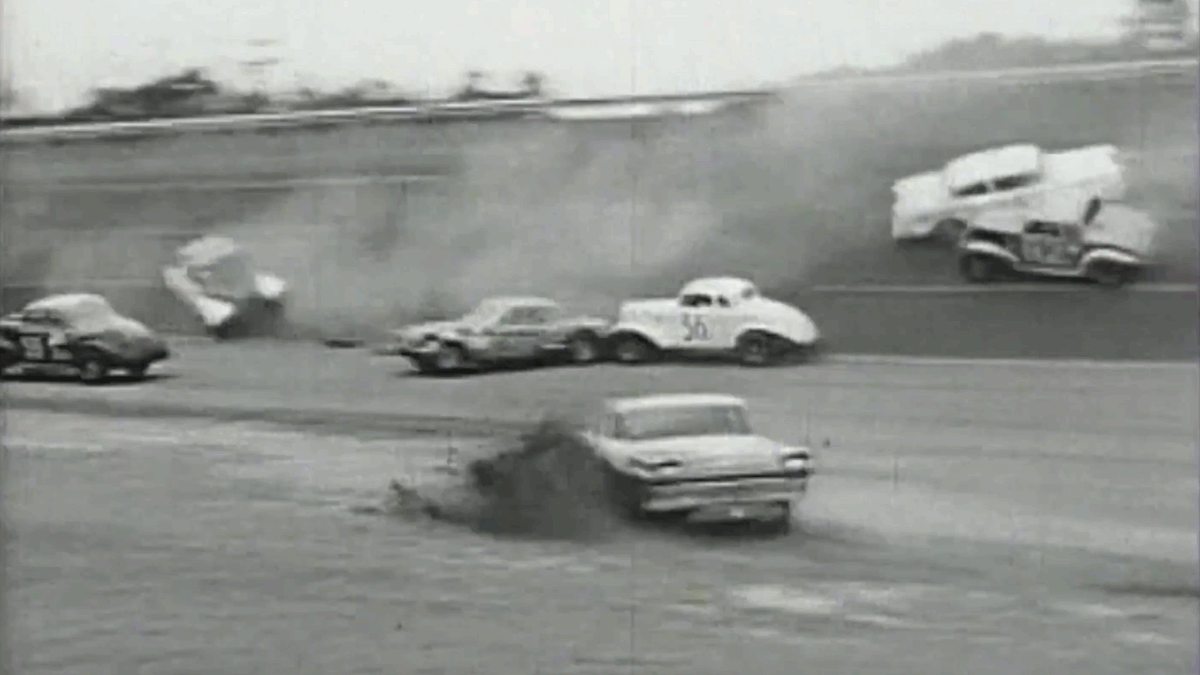The 28-car wreck at Talladega Superspeedway near the end of Sunday’s YellaWood 500 broke the Cup Series record for the largest crash, adding another catastrophic chapter to stock car racing’s long history. However, the massive crash was nine cars short of NASCAR’s overall record set in 1960 during the opening lap of a Modified-Sportsman race at Daytona.
NASCAR was only an 11-year-old organization in 1960. The cars in the highest division were still so stock that they were raced with the windows rolled down and headlights taped to prevent a sharp shower of glass during crashes. The rules were looser in NASCAR’s lower divisions. The Modified Division allowed a plethora of modifications as long as they could be concealed under a stock body. The Sportsman Division was a middle ground between the top division’s stock cars and the modifieds.
Both lower divisions often competed in combined races on the NASCAR undercard, hence the compound term “Modified-Sportsman.” This was the case for a 250-mile race held the day before the 1960 Daytona 500, where 68 drivers lined up to fight over a $26,475 purse. This was a massive field, considering there’s a 40-car limit for Cup Series races today.
Over half the field failed to complete the first lap after a Chevrolet hit the apron at the bottom of Turn 4 and spun out. Several other drivers lost control, trying to avoid the spinning Chevy. Drivers further back had nowhere to go and simply piled into the incident. When it was all said and done, 37 cars were collected. There was so much wreckage on the grass inside Turn 4 that it looked like a junkyard.
Miraculously, no one was killed. Only five drivers were transported to nearby Halifax Medical Center with minor injuries. There was also no fire despite multiple cracked fuel tanks within the car graveyard. It was probably a relief for at least one television executive, considering that CBS provided coverage of NASCAR’s races at Daytona for the first time, allowing viewers across the country to watch the mayhem.
The wreck featured a few names that modern fans are likely familiar with. Wendell Scott, NASCAR’s first Black race-winner, and Ralph Earnhardt, the father of Dale Earnhardt Sr., both crashed out on the first lap. Earnhardt told the Charlotte Observer:
“We were coming out of the last turn, and got shut off. My car was knocked end over end. I thought this was it. I’ve been running modifieds a long time, but I’ve never seen anything like this one today.”
After a 40-minute delay, the race resumed with 38 original starters joined by six cars that failed to qualify to bolster the depleted field. Bubba Farr would win the 100-lap race in a Ford fitted with a Lincoln engine. There wasn’t much room for more chaos, with 34 laps run under caution in the rain.
Believe it or not, Daytona International Speedway had a spotless safety record before 1960. A weekend report in the Greensboro Record was titled “Daytona’s Reputation As Safe Track Spoiled With Crack-Ups.” The 2.5-mile high-banked oval was only a year old at this point. The races held during its inaugural season featured no crashes. It was a far cry from crashes being a selling point for today’s superspeedway races.

